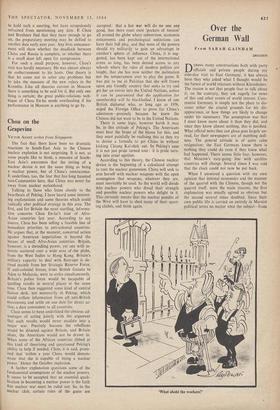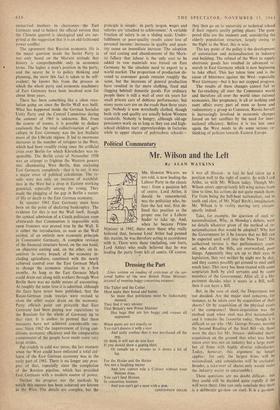Over the German Wall
From SARAH GAINHAM
DRESDEN
DURING many conversations both with party officials and private people during my nine-day visit to East Germany, it has always been they who asked what I thought would be the future of world relations without Khrushchev. The reason is not that people fear to talk about it; on the contrary, they ask eagerly for news of this and other events of world interest. Com- munist Germany is simply not the place to dis- cover either the crucial grounds for his dis- appearance, or how things are likely to change under his successors. The assumption was that I must know more about it than they did, and since they know almost nothing, this is justified. What official news they can glean goes largely un- read, for their newspapers are of numbing dull- ness. The general attitude is of quite cairn resignation; the East Germans know there is nothing they could do even if they knew what had happened. There seems little fear, however, that Moscow's easy-going line with satellite countries will change. Several times I was told that the clock could not now be put back.
When I answered a question with my own opinion that internal economics and the manner of the quarrel with the Chinese, though not the quarrel itself, were the main reasons, the first explanation was usually agreed as obvious but the second several times doubted. Since their own public life is carried on entirely in Marxist political terms no matter what the subject—from
'What abatit the workers?'
unmarried mothers to electronics—the East Germans tend to believe the official version that the Chinese quarrel is ideological and are sur- prised at the suggestion that it is an old-fashioned power conflict.
The agreement that Russian. economic life is the major question inside the Soviet Party is not only based on the Marxist attitude that history is comprehensible only in economic terms. The higher a man's position in the party, and the nearer he is to policy thinking and planning, the more this fact is taken to be self- evident; he knows this from the process in which the whole party and economic machinery of East Germany have been involved now for about three years.
There has been something like a silent revo- lution going on since the Berlin Wall was built. What has happened inside the German Socialist Unity Party and the Central Committee during the summer of 1961 is unknown. But, from the course of events, it is possible to deduce cautiously that the total collectivisation of agri- culture in East Germany was the last Stalinist move of the Ulbricht regime. It led to enormous increases in the number of refugees to the West, which had been steadily rising since the artificial crisis over Berlin for which Khrushchev was re- sponsible. The Berlin crisis of November 1958 was an attempt to frighten the Western powers into abandoning West Berlin, thus enclosing East Germany completely—that is to say, it was a major error of political calculation. The re- sults were not only an increase of watchful- ness in the West but a drop in Eastern working potential, especially among the young. They made the plugging of the gap in Berlin a matter of life or death to the East German economy.
In summer 1961 East Germany must have been on the point of declaring bankruptcy. The evidence for this is not the Wall itself, though the cynical admission of a Czech politician soon afterwards that Communism is impossible with open frontiers was proved true by the Wall. It is rather the introduction, as soon as the Wall existed, of an entirely new economic principle ,in Communist Germany. A complete revision of the financial structure based, on the one hand, on objective costing and, on the other, on in- centives in every branch of the economy in- cluding agriculture, combined with the newly achieved control over the East German Mark to change the economic situation in a few months. As long as the East German Mark could drain out along with workers through West Berlin there was no stable means of accounting. At roughly the same time it is admitted, although the facts have never been published, that the Russo-German trade treaties were revised to close the other major drain on the economy. Party officials point out privately that East Germany had been paying war reparations to the Russians for the whole of Germany up to that time. It is useless to pretend that these measures have not achieved considerable suc- cess. Since 1962 the improvement of living con- ditions, economic efficiency and the comparative contentment of the people have made some very large strides.
Put crudely in cold war terms, the last moment when the West could have enforced a total col- lapse of the East German economy was in the early part of 1961. There is no longer any pros- pect of that, especially since the completion of the Russian pipeline, which has provided East Germans with a modern source of power.
Neither the progress nor the methods by which this success has been achieved are known in the West. The details are complex, but the
principle is simple: in party jargon, wages and salaries are 'attached to achievement.' A variable fraction of salary is on a sliding scale. Under- fulfilment or poor-quality results cause loss of personal income; increases in quality and quan- tity cause an immediate increase. The adoption of real costing and abandonment of the Marx- ist fallacy that labour is the only cost to be added to raw materials was forced on East Germany by the absolute need to export to a world market. The proportion of production de- voted to consumer goods remains roughly the same, but the increases of general production have resulted in far more clothing, food and (lagging behind) domestic goods. For ordinary people there is still a wait of over six years for small private cars of dubious performance, but many more cars are on the roads than three years ago. Nobody is now wretchedly clothed, though both style and quality are usually below Western standards. Nobody is hungry, although old-age pensioners work on as long as they can and high- school children start apprenticeships in factories while in upper classes of polytechnic schools—
they then go on to university or technical school if their reports justify getting places. The pam- pered elite are the students and, considering the elderly population structure, largely owing to the flight to the West, this is wise.
The key point of the policy is the development of automation and nationalisation in industry and building. The refusal of the West to supply electronic goods has resulted in advanced re- search in East Germany which is now beginning to take effect. This has taken time and is the cause of bitterness against the West--especially West Germany—but it has not stopped progress.
The results of these changes cannot fail to be far-reaching all over the Communist world and therefore all over the world since rational economics, like pregnancy, is all or nothing and must affect every part of even so loose and rudimentary a group as Comecon. Russia hersell is increasingly involved in economic changes forced on her satellites by the need for inter- national efficiency. Before it is • too late once again the West needs to do some serious re- thinking of policies towards Eastern Europe.











































 Previous page
Previous page